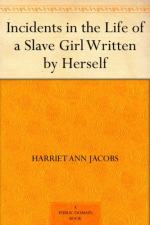I had been there nearly a year, when a dear little friend of mine was buried. I heard her mother sob, as the clods fell on the coffin of her only child, and I turned away from the grave, feeling thankful that I still had something left to love. I met my grandmother, who said, “Come with me, Linda;” and from her tone I knew that something sad had happened. She led me apart from the people, and then said, “My child, your father is dead.” Dead! How could I believe it? He had died so suddenly I had not even heard that he was sick. I went home with my grandmother. My heart rebelled against God, who had taken from me mother, father, mistress, and friend. The good grandmother tried to comfort me. “Who knows the ways of God?” said she. “Perhaps they have been kindly taken from the evil days to come.” Years afterwards I often thought of this. She promised to be a mother to her grandchildren, so far as she might be permitted to do so; and strengthened by her love, I returned to my master’s. I thought I should be allowed to go to my father’s house the next morning; but I was ordered to go for flowers, that my mistress’s house might be decorated for an evening party. I spent the day gathering flowers and weaving them into festoons, while the dead body of my father was lying within a mile of me. What cared my owners for that? he was merely a piece of property. Moreover, they thought he had spoiled his children, by teaching them to feel that they were human beings. This was blasphemous doctrine for a slave to teach; presumptuous in him, and dangerous to the masters.
The next day I followed his remains to a humble grave beside that of my dear mother. There were those who knew my father’s worth, and respected his memory.
My home now seemed more dreary than ever. The laugh of the little slave-children sounded harsh and cruel. It was selfish to feel so about the joy of others. My brother moved about with a very grave face. I tried to comfort him, by saying, “Take courage, Willie; brighter days will come by and by.”
“You don’t know any thing about it, Linda,” he replied. “We shall have to stay here all our days; we shall never be free.”
I argued that we were growing older and stronger, and that perhaps we might, before long, be allowed to hire our own time, and then we could earn money to buy our freedom. William declared this was much easier to say than to do; moreover, he did not intend to buy his freedom. We held daily controversies upon this subject.
Little attention was paid to the slaves’ meals in Dr. Flint’s house. If they could catch a bit of food while it was going, well and good. I gave myself no trouble on that score, for on my various errands I passed my grandmother’s house, where there was always something to spare for me. I was frequently threatened with punishment if I stopped there; and my grandmother, to avoid detaining me, often stood at the gate with something for my breakfast or dinner. I was indebted to her for all my comforts, spiritual or temporal. It was her labor that supplied my scanty wardrobe. I have a vivid recollection of the linsey-woolsey dress given me every winter by Mrs. Flint. How I hated it! It was one of the badges of slavery.




